|
Charles LindberghCharles Lindbergh was an heroic American aviator whose baby son was tragically kidnapped and murdered. But he was also a white supremacist, Nazi wannabe.Lindbergh had energized the world when in 1927 he became the first pilot to successfully complete a nonstop flight across the Atlantic. He established a world record and collected a $25,000 reward from New York entrepreneur Raymond Orteig. The feat earned Lindbergh the nickname "The Lone Eagle," and his historic plane "The Spirit of St. Louis" now resides in the Smithsonian.
After the trial, Lindbergh and his wife moved to England to escape the American press. Soon thereafter he became enamored of Nazi Germany, admiring the policies of Hitler's regime. After making a couple of visits he even began making plans to move there permanently. Lindbergh became active in the isolationist movement, urging England and the United States to observe complete neutrality should war break out. He lobbied the British people to appease Hitler, helping to pave the way for the Munich Pact. These efforts were greatly appreciated by the Germans. Joseph Goebbels wrote in his diary:
Lindbergh has written a really spirited letter to Roosevelt. He is the president's toughest opponent. He asked us not to give him too much prominence, since this could harm him. We have proceeded accordingly.
Marshal Goering, of coarse, was the last to arrive (at the dinner). I was standing in the back of the room. He shook hands with everyone. I noticed he had a red box and some papers. When he came to me he shook hands, handed me the box and papers and spoke a few sentences in German. I found he had presented me with the German Eagle, one of the highest German decorations, "by order of Der Fuhrer."
In December, New Jersey Attorney General David P. Wilentz told a newspaper:
"The people of England are about finished with him. Americans are beginning to feel the same way, and the halo of hero worship around Lindbergh's head is getting pretty well tarnished." But none of this managed to dissuade Lindbergh. In April 1939, he made a nationwide radio broadcast urging white Americans to support strict neutrality in the coming war. "These wars in Europe are not wars in which our civilization is defending itself against some Asiatic intruder. This is not a question of banding together to defend the white race against foreign invasion."
Aviation is a tool especially shaped for Western hands, a scientific art which others only copy in a mediocre fashion; another barrier between the teeming millions of Asia and the Grecian inheritance of Europe—one of the priceless possessions which permit the White race to live at all in a sea of Yellow, Black and Brown... This is the kind of talk only a fellow racist could love. It should be no surprise, then, that he got along famously with industrialist Henry Ford. Lindbergh gushed about a December 1939 meeting:
I talked to Ford about the war, the industrial situation in America, about his ideas of decentralization etc. He is a combination of genius and impracticability, with the genius definitely on top. Ford is a great man and a constructive influence in this country. One cannot talk to him without gaining new ideas and receiving much mental stimulation. His greatness is demonstrated by his vision and his success industrially and by his interests and activities in many other fields. With encouragement from friends like Ford, Lindbergh continued lobbying for American isolationism. On September 11, 1941 Lindbergh finally made one speech too many. Before a large crowd in Des Moines, Iowa, he declared:
"The three most important groups who have been pressing this country toward war are the British, the Jewish, and the Roosevelt Administration." There were boos and catcalls, but Lindbergh persisted. He had more to say about those warmongering Jews:
"Instead of agitating for war, Jews in this country should be opposing it in every way, for they will be the first to feel its consequences. Their greatest danger to this country lies in their large ownership and influence in our motion pictures, our press, our radio and our government." That was finally it. The public could stand it no longer. Britain was getting their asses kicked in Europe and everybody knew that American involvement was right around the corner, one way or another.
Immediately after Germany's defeat, Lindbergh went to see the aftermath for himself. He toured the Belsen concentration camp in June 1945 and witnessed ditches full of cremated ashes. His takeaway from the experience?
What the German has done to the Jew in Europe, we are doing to the Jap in the Pacific. Evidently Lindbergh believed that even if the Germans were up to no good, we Americans certainly had no right to judge them.
Timeline
|
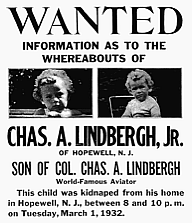 The Lindbergh Baby was kidnapped for ransom in 1932. Its decomposed body was located 10 weeks later, but only after the Lindberghs had already handed over $50,000 in gold certificates. In 1935, immigrant carpenter and convicted felon Bruno Richard Hauptmann was found guilty of the crime. He was executed the following year in the
The Lindbergh Baby was kidnapped for ransom in 1932. Its decomposed body was located 10 weeks later, but only after the Lindberghs had already handed over $50,000 in gold certificates. In 1935, immigrant carpenter and convicted felon Bruno Richard Hauptmann was found guilty of the crime. He was executed the following year in the 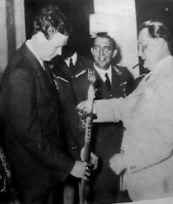 During his third visit to Nazi Germany, in October 1938, Lindbergh received the Service Cross of the German Eagle (Verdienstkreuz der Deutscher Adler), the second-highest honor the Reich could bestow on noncitizens. It was presented to him by Reichsmarshal
During his third visit to Nazi Germany, in October 1938, Lindbergh received the Service Cross of the German Eagle (Verdienstkreuz der Deutscher Adler), the second-highest honor the Reich could bestow on noncitizens. It was presented to him by Reichsmarshal 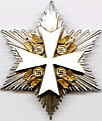 Apart from other Jew-hating Nazi lovers like
Apart from other Jew-hating Nazi lovers like 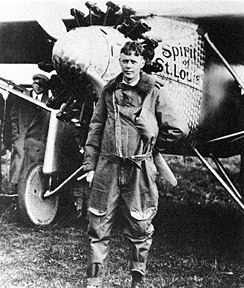 That same year, Lindbergh wrote an article for Readers' Digest magazine, entitled "Aviation, Geography and Race." He reiterated the necessity of maintaining strict neutrality regarding Germany's struggle against Europe's nonwhite populations:
That same year, Lindbergh wrote an article for Readers' Digest magazine, entitled "Aviation, Geography and Race." He reiterated the necessity of maintaining strict neutrality regarding Germany's struggle against Europe's nonwhite populations:
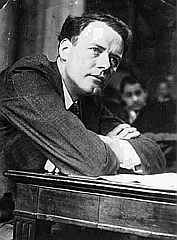 After the Japanese sneak attack on Pearl Harbor, President Roosevelt refused to reinstate Lindbergh's commission in the Air Force Reserves. And none of the airplane manufacturers was willing to give him a job, except for his old friend Henry Ford. Lindbergh helped streamline the world's largest assembly line for building bombers, Ford's B-24 factory in Michigan.
After the Japanese sneak attack on Pearl Harbor, President Roosevelt refused to reinstate Lindbergh's commission in the Air Force Reserves. And none of the airplane manufacturers was willing to give him a job, except for his old friend Henry Ford. Lindbergh helped streamline the world's largest assembly line for building bombers, Ford's B-24 factory in Michigan.